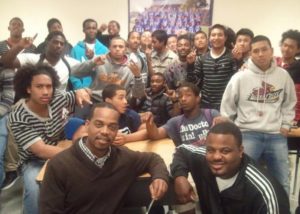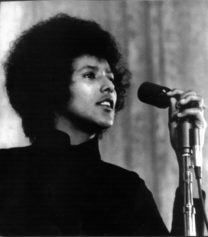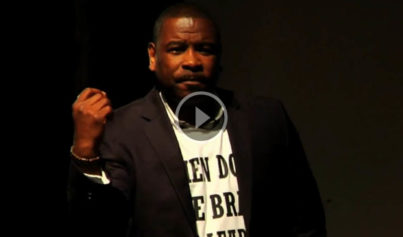
An MDP teacher, Earnest Jenkins, speaking with one of his students, Asim. Photo courtesy of UC Davis
Stop assuming Black boys are the problem.
That’s the first step every school must take if the administrators are truly interested in helping their Black male students achieve academic success in the classroom, according to Vajra Watson, director of research and policy for equity at the University of California, Davis.
It’s the crucial step that some schools in Oakland, California, have already made, and they are now reaping the rewards.
Back in 2010, Oakland Unified School District (OUSD) launched an initiative called the Manhood Development Program (MDP). The program offered a special set of elective courses that targeted Black male students.
Through these extra courses and additional quality time with teachers, the students in the program not only began to excel academically, but they also gained a new perspective of what it means to be Black.
“When students begin the program, many of them define blackness in America to be ugly, to be bad and all of these negative attributes,” Watson said of the program in a report that accompanied the program’s January press release. “And then after being a part of the program and the brotherhood and learning about themselves, they start to identify as young kings, as scholars.”
Educators were hopeful that the program would result in even the slightest positive impact for their Black male students, but the final results would exceed their expectations.
Suspension rates for Black male students started to plummet in the district, and the graduation rates soared.
Grade point averages for the children in the program received a major boost, and their perception of their teachers was much more positive.
The report claimed that students in MDP were far more likely to report that their teachers were interested in seeing them succeed. They were also more likely to be proud of being Black.
The program has serious potential for closing the academic achievement gap, especially if more school districts adopt similar programs.
“Oakland dared to name institutionalized racism — and not the children — as the problem,” Watson reported. “MDP turned a vision into a reality, a theory into action — school districts across the country now have a model for African American student success.”
Studies have frequently shown that having a mentor can dramatically boost a Black boy’s chances of success in school, and this program, along with others throughout the district, has done an excellent job of providing the students with just that.
MDP is a part of the district’s Office of African American Male Achievement, which aims to help Black male students form closer bonds with their teachers.
Officials believed this would help the students build leadership skills and have an additional source of support.
According to one MDP student, it was particularly helpful for some of the students who didn’t have active father figures in their lives.
“He’s like a father,” one student told Watson of one of his instructors, according to The Huffington Post. “Especially because some of us don’t have a father … So to have somebody that cares like that, it feels good.”
Officials throughout the district told The Huffington Post that they believe this program has unlocked the key to closing the academic achievement gap.
Now, they hope, other schools across the nation will follow the blueprint that has been set before them.



